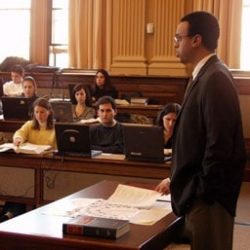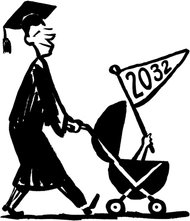
In an era of large federal deficits, amidst a political culture that makes raising taxes all but impossible, there’s a particularly high need to guard against unnecessary or even inappropriate federal spending. How, then, to explain the National Science Foundation’s awarding just under $50,000 for a conference to “offer guidance” to “underrepresented” minority political science […]
Read More
“But when humanism became the servant of the political or university establishment it lost its vitality and, indeed, its credibility… Willem Frijhoff discussing 16th century humanism in A History of the University, Vol. II (Cambridge U Press), p. 45 […]
Read More
The year was 1996. Bill Clinton was serving his first term as president. Barack Obama was a civil-rights attorney in Chicago who had yet to hold any public office. It was that long ago. According to J. Patrick Kelly, vice dean of the Widener University School of Law, 1996 was the year that Professor Lawrence […]
Read More
Stigmatism, n. A variant of astigmatism, particularly virulent in academia, in which visual impairment derives not from an irregularly curved cornea but from ideologically distorted vision that in many cases prevents its victims from perceiving the stigma from which they suffer and in others prevents them from recognizing the source of the stigma they do […]
Read More
At Columbia, how is it that the repeal of “Don’t Ask, Don’t Tell” could inspire such heated debate among students? The average student opposing the return of the Reserve Officers’ Training Corps to Columbia University might be fairly described as a left-wing “radical,” while the university’s tiny conservative contingent is surely among the program’s supporters. […]
Read More
The many surveys backing up what those of us in the academy know only too well—that liberals vastly outnumber conservatives—are used to bolster the idealistic argument for “intellectual diversity.” But a viewing of an incident at the recent CPAC conference and a video of a philosophy professor further confirmed my beliefs that it is not […]
Read More
With “Don’t Ask, Don’t Tell” repealed, Columbia University has quickly moved to re-examine whether it should once again formally participate in the Reserve Officers Training Corps program. At the second of three public hearings designed to gather input from the Columbia community, freshman Anthony Maschek calmly made his case for returning ROTC to campus, only […]
Read More
A few years ago, in the midst of the controversy over inappropriate faculty behavior in Columbia’s Middle East Studies department, more than 100 professors, led by former provost Jonathan Cole, signed a document demanding that the Columbia administration defend the faculty from outside criticism—without even determining the merits of that criticism. This approach essentially redefined […]
Read More
This is an excerpt from Schools for Misrule, Legal Academia and an Overlawyered America, to be published March 1 by Encounter Books. Walter Olson, a senior fellow at the Cato Institute, is author of The Litigation Explosion and creator of the popular blog Overlawyered.com. *** In his 1918 book The Higher Education in America, the […]
Read More
In the current New Yorker, Malcolm Gladwell entertainingly explains why computing a unidimensional ranking of educational quality from multidimensional indicators is a fool’s errand. In the case he examines, the project is to identify the best schools in order of quality, when the best school does not exist any more than a best kind of […]
Read More
The activities of Wisconsin governor Scott Walker have brought unusually high public attention to the status of public employee unions. Few, if any, public employee unions could withstand intense media focus less han those representing higher education: too often these unions provide a caricature of the critics’ vision—organizations that seek to use the public dime […]
Read More
High school students taking advanced placement courses in economics are being shortchanged. In 2010 the College Board and Educational Testing Service (ETS) administered 134,747 Advanced Placement (AP) microeconomics and macroeconomics exams to high school students. A new study systematically reviews the content of AP Economics. AP Economics gives ample attention to market failure, but no […]
Read More
One of my colleagues here at the University of Texas–Austin, the economist Daniel Hamermesh, recently complained in his New York Times “Freakonomics” blog about the common practice in many departments of assigning no final exams. I wish he had applied his own craft to this situation. The lack of final exams is merely one symptom […]
Read More
A month ago, Robert Paquette, history professor at Hamilton College, wrote a commentary at the National Association of Scholars website that concluded with a sad note. After reviewing several initiatives and offices at Hamilton that aim to promote the atmosphere of diversity and raise the “comfort level” of all students, then rehearsing some of the […]
Read More
When news came out recently that this year’s college freshmen rank their emotional well-being at record-low levels, observers in the media and the ivory tower began to wring their hands. Just how depressed are young men and women on campus? According to researchers at UCLA who conduct the annual “American Freshman” survey, the percentage of […]
Read More
Trying to rank hundreds, if not thousands of colleges is obviously foolish, but this foolishness has consequences beyond supplying iffy advice to clueless shoppers. To the extent that potential enrollees take ratings seriously, institutions may be tempted to game the system and these tricks may well undermine education. To use Malcolm Gladwell’s illustration from Car […]
Read More
As the author of a college guide that tries to help college-going students identify schools that would be a good “match” for them as individuals, I’ve always had three main gripes with the U.S. News & World Report rankings. First, you can’t quantify the really important factors that go into selecting the right college, such […]
Read More
The U.S. News & World Report rankings of America’s “best” colleges and universities amount to nothing more than an annual ritual, a predictable coronation of entrenched wealth and power. Even more importantly, for aspiring students and parents who hope to transcend their present class status, the yearly “guide” serves as the handmaiden to the elite. […]
Read More
At the Student Free Press Association, we’ve partnered with the Institute for Jewish & Community Research to establish $1000 awards for excellence in student reporting on anti-Semitism. To learn how to enter, go here. From the press release: Campuses have become staging grounds for campaigns demonizing Israel, intimidating Jewish students and threatening the foundation of […]
Read More
I’ve argued that there’s a way for-profit colleges to increase their credibility as genuine educational institutions rather than dropout factories running on federal student aid: they could focus their efforts and investment dollars on creating high-quality courses and courseware that the non-profit world might respect. And now, one for-profit institution, Capella University, seems to be […]
Read More
Malcolm Gladwell has written his share of interesting and penetrating essays in The New Yorker in recent years. He has also authored such best-selling books as Blink, which is about rapid cognition and intuition, and The Tipping Point, which addresses the factors that contribute to unexpected change. The relevance of Tipping Point has received another […]
Read More
Legacy preferences have come under increased scrutiny of late, as well they should. Most elite colleges and universities, including all the Ivies, grant legacy preferences, just as they all grant special consideration — and lowered admission standards — for recruited athletes, blacks, Latinos, and Native Americans. They also give huge boosts to the sons and […]
Read More
During my service as a member of the accreditation committee of the American Bar Association, the ABA added a 200th school to their roster of accredited law schools. This growth could be seen as a cause for celebration– the roster of new schools included many with missions that would clearly benefit society. Public service law […]
Read More
When radical professor Frances Fox Piven said she wanted to see protest riots in America like those in Greece and Britain (considerable damage and four people dead in Greece) academics and academic associations spoke out. Not to deplore her call for violence, but to denounce Glenn Beck’s over-the-top criticism of her on Fox News and […]
Read More
Alan S. Kahan has cast new light on an ongoing conflict with origins in classical antiquity if not earlier. Kahan’s Mind vs. Money: The War Between Intellectuals and Capitalism is a learned and engaging account of the tension between the amorality of the marketplace and the moralism of would-be priestly authorities. Until the Enlightenment, merchants […]
Read More
At first glance, John Tierney’s report in the New York Times on the liberal-conservative imbalance of faculty looks like just another account of a very familiar subject. But read it twice and you can see why it became one of the most talked-about articles on higher education in months. How did this happen? First, it […]
Read More
It is not really news to most of us that the most avid and outspoken devotees of “diversity” often live and work in the most politically and ideologically un-diverse pockets of America, academic communities, but that must have been news to editors at the New York Times since they found reporter John Tierney’s surprisingly intelligent […]
Read More
University of Virginia English professor Mark Edmundson has a penetrating, but saddening article in the Chronicle of Higher Education this week. It’s called “Narcissus Regards a Book”, and it laments a terrible outcome of the academic culture wars of the late-1980s and early-1990s. Edmunson recalls the infamous chant of students at Stanford—in his rendition, “Hey-ho, […]
Read More
By Robert Martin and Andrew Gillen A popular notion within the academy is that teaching quality cannot be measured, but this is an article of faith, not a demonstrated fact. Very few institutions have made a systematic effort to measure teaching quality, largely because the faculty is opposed to it and administrators have little incentive […]
Read More
Duke—which is defending a civil suit filed by most of the unindicted lacrosse players and their families—isn’t the only university being sued, in part, for bowing to politically correct winds on campus. Brown, a prominent donor, and the donor’s daughter are facing a civil suit, for allegedly conspiring to drive out of school a former […]
Read More